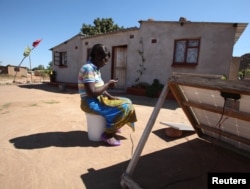Ngqabutho Mabhena is unusually nervous about this year's trip home to Zimbabwe. That's because, this time around, he's hand-carrying a wad of currency from South Africa to family members in the cash-strapped nation.
Normally, he would send the funds by wire transfer from South Africa, for his family to collect from a bank on the other end. But he and countless other expatriate Zimbabweans are resorting to creative, and sometimes risky, measures as Zimbabwean banks rapidly run dry in the nation's largest cash crisis seven years.
Mabhena, who runs a Zimbabwean community group in Johannesburg, spoke to VOA from a bus en route to Zimbabwe. For his safety, he didn't want to share too many details about his itinerary or cargo.
"It's not safe, it's not safe," he said. "But these days, there is nothing that one can do. And I know some people who are not travelling [to Zimbabwe], who are now resorting to sending their money with drivers and so on. Most of this money gets lost along the way."
The cash crisis has its roots in Zimbabwe's decision to abandon its wildly inflating dollar in 2009, making the U.S. dollar the dominant currency. Since then, the economy has worsened, unemployment has risen, the government has struggled to pay civil servants, and in recent months, banks have begun to run dangerously low on dollars. The government plans to print up to $200 million worth of bond notes, but Zimbabweans have widely shunned the local-use-only bills, over fears they are a reincarnation of the doomed Zimbabwean dollar.
The crisis has opened the door for creative, cashless solutions, like mobile-phone banking.
A South African wire transfer service recently introduced electronic payments to Zimbabwe in South African rand — which is already legal tender in Zimbabwe, but is not considered stable enough to be widely embraced. Some Zimbabwean economists have recommended adopting the rand, but the government has resisted because, analysts say, they don't want to be subject to conditions imposed by the Rand Monetary Union.
Raphael Grojnowski, cofounder of a South Africa-to-Zimbabwe transfer service called Mama Money, lamented the cash crisis, but says it has also provided new opportunities. In the last year, he says, 20,000 new customers have joined Mama Money, with the average customer sending home 1,500 rand — just over $100 — per month. It's not known how exactly many Zimbabweans live in South Africa, but some estimates put the figure as high as five million.
"So we've seen, since the cash crisis and people struggle to get cash, people are requesting electronic redemption a lot more, because at least then they know the money has arrived in Zim[babwe], and they can use it to buy goods and services in store, buy electricity, buy airtime, and also cash out when there is an opportunity to cash out at a bank or at an ATM," Grojnowski said.
Johannesburg-based truck driver Christopher Mutokwi isn't planning to return to Zimbabwe this holiday season. And so, the 42-year-old, who estimates that he supports 10 family members back home with about half of his monthly earnings, says he's had to employ creative workarounds for his family members don't have debit or credit cards for big purchases.
For example, he said, his family is struggling to scrape together the cash they will soon need for the children's school fees. He sends money via a supermarket chain, and they try to see how much cash they can get.
"They were telling me that sometimes they end up taking groceries. Then they will get some cash — the change, in fact," he said.
In Harare, business consultant Phillip Chichoni said the move to a cashless economy isn't entirely bad, but that expatriates and foreign services can't fix Zimbabwe's economic problems.
"The economy needs to be fixed from the top," he said. "I think the government policies have to be aligned and they have to be tuned to encourage production and investment in the country."
But most discussions about Zimbabwean policy eventually circle back to the man at the top, longtime president Robert Mugabe, who is now 92. His critics blame him for dismantling the once-thriving economy during his thirty-six-year rule.
The prospect for a major shakeup looks slim. Earlier this month, Zimbabwe's ruling party announced that for them, there is only one possible candidate for president in 2018: Mugabe.





